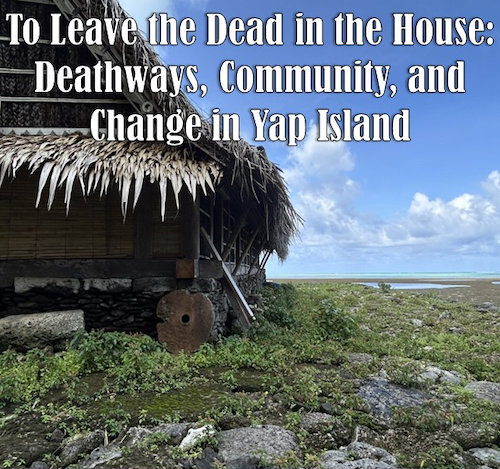Potter College News
Yap Islander Will Present on Death Traditions
- Julius Ayin and Carolyn Castellanos-Reyes
- Wednesday, February 21st, 2024

Julius Ayin, a senior studying anthropology and folklore at WKU, will present “To Leave the Dead in the House: Deathways, Community, and Change in Yap Island” as part of the Department of Folk Studies and Anthropology’s monthly Brown Bag Lecture Series. The presentation, which is free and open to the public, is Friday, February 23 at 11:30am CST in Fine Arts Center 239 and a Zoom option is available.
We asked Mr. Ayin what it is like to live in Yap, which part of an island group in the western Pacific Ocean. “The Island of Yap proper is about 38 square miles, pretty lightly populated. I'm from out in the villages where facilities are a bit scanter and people are used to a more traditional way of life – subsistence fishing, horticulture, chieftains, and longhouses. In the more developed areas around the capital, you might as well be in a small town in South Florida or Hawaii.”
He shared some ways that Yap culture is different from American culture. “Well, for example, if people see you working, they'll thank you – and I don't just mean a paid job, it can be tending a garden or picking up trash, and even extends as far as attendance at church or school. All of these things are the ‘work’ that makes up society. So, there's a very strong community ethos. My presentation is about community more than anything.”
Mr. Ayin’s presentation examines a particular aspect of Yap culture from a community perspective. “‘Deathways’ is just fancy talk for all the practices we have surrounding death. Some that you might be used to are putting on black clothes in the mourning period or laying flowers on a grave. On Yap you might see these things, but you also might see people getting buried with loose-leaf tobacco or personal tools, for example.”
With a plan to pursue a career in archaeology, Mr. Ayin described how his life experiences influenced his choice on what to study at WKU. “I immigrated as a child, and I'm also an Army brat – a very transient background. All my life I've been immersed in cultures very different from my own, and I've had to adapt and mediate between these disparate ways of life. So, in a way, I got familiar with thinking about things in anthropological and folkloristic ways long before I had the language to realize that.”
For the Zoom link or information about the Brown Bag Lecture Series, contact fsa@wku.edu.
Some of the links on this page may require additional software to view.

